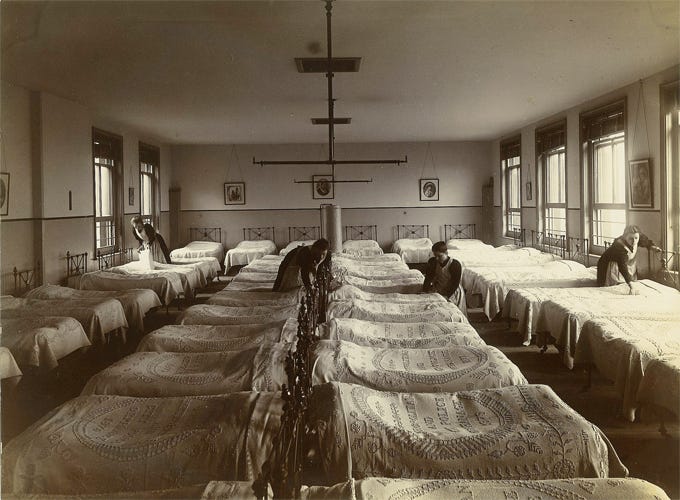The cover says it all: An irresistible story of two children in a London orphanage. This is my second review of a Norman Collins novel, the first being London Belongs To Me, which I thoroughly recommend.
Finding another Collins novel was an experiment - was London a one-off? I’m happy to report that I was not disappointed, this is another immersive, compelling read, with plenty of humour, lots of larger than life characters, and a thrilling chase which felt a little like a precursor to Thelma and Louise, but with a happier ending.
The Archbishop in question is the long dead Archbishop Bodkin, who has given his name to a large children’s orphanage in Putney, South-West London (500 of the poor little things from babies to teenagers). The story is set in the 1920s and 30s, before the Welfare State began to change the way we provide care for vulnerable children. In fact there are only two ‘children of the Archbishop’ who feature to any extent in the plot, being Sweetie, whom we first meet when she is being abandoned at three weeks old on the steps of this rather imposing institution, and the scallywag Ginger, whose origins are even murkier.
As in London, most of the humour and interest of the novel comes from the various adult characters who superintend the Orphanage, from Dame Eleanor who chairs the Board of Governors, and has fingers in every charitable pie in London, to the mysterious and beautiful nursemaid Margaret. The arrival of a new Warden, with an ambitious agenda of reforms and cost-saving initiatives, kickstarts the plot. He is a man with no sense of humour, not much intelligence, a massive and unwarranted superiority complex and a lust for power. His name, I kid you not, is Dr Trump. Write your own jokes. Then there is Mr Prevarius, an unfrocked clergyman, disgraced following a misunderstanding at a church fete involving plum wine and a fortune teller in a tent. His attempts to find love through a dating agency lead to near disaster - do you remember the Pina Colada Song? Again, Norman Collins came up with the twist first. I wish we had more of Miss Bodkin, the oldest surviving relic of the great Archbishop and one of the Governors, who religiously attends every meeting of the Board, but her hearing aid doesn’t work and she’s never on the right bit of the agenda.
The story unwinds over the eighteen years it will take Sweetie to grow to adulthood, and the one constant throughout will be her inexplicable passion for Ginger, who doesn’t get the point of girls…until the very end. Of course the mystery of her birth will have to be solved - does any story which starts with a baby abandoned on the steps of an orphanage not have to produce a parent at some stage in the plot? Collins is not subtle in the clues he drops, it would not take a Poirot to work it out. But it is still nicely done.
Of course, the other principal character in the story is inter-War London, the London revealed to Ginger on one of his attempts at escape, of crowded buses and gas lamps, of black barges laden with goods sliding under the arches of Putney Bridge, of brightly-lit public houses, of teashops and coffee stalls with gleaming copper urns, and great piles of crusty meat pies and ham sandwiches wrapped up in a clean white napkin, of the lights of Piccadilly and gleaming sportscars and ladies of the night, and the smell of scent and cigar smoke in the air. But when Ginger needs to find somewhere to sleep, Collins shows us the other London, down by Hungerford Bridge:
Purely by luck and without knowing it, he had stumbled on London’s largest bedroom. There were sleepers on all the benches, old men, old women and figures so non-descript that he couldn’t have said what they were unless he asked them. With their mufflers and their bundles and their tin kettles and gaping shoes tied with string, they were quietly dozing. It was, in fact, right into the dormitory of the string population that he had stumbled.
I am not going to pretend that the creation of the Welfare State solved all these problems. The arches under Hungerford Bridge were still one of the principal dormitories for the homeless when I was working in London in the 1980s - and although there have been several attempts to clear up and beautify the space, I suspect it still is. The one thing that has definitely changed, however, is the concept of the orphanage. I typed ‘orphanage’ into a Google map of London just now, and as far as I could see the only locations that emerged were charities supporting orphanages in other less fortunate countries than our own, and one or two museum pieces. Now we have adoption agencies, we have foster parents, and we have supported living in attractive-looking care homes for our more vulnerable children. (Not enough of them, I’m sure.) It is a sad fact that although very few children in this country will be ‘orphaned’, as barring accidents most parents live much longer, yet there are still many children who need to be cared for in safe environments.
Archbishop Bodkin’s Hospital was not a figment of Collins’ imagination. Of course there were many such institutions before the Second World War, often founded by religious groups in the great age of Victorian philanthropy. In 1870 a charity was founded in London to house the orphans of the Metropolitan Police service. It continues as a charity to this day, but the home has closed. The website is well worth a look, as the gallery of photographs is marvellous.
There is much that chills the heart in Collins’ tale, and the author does not hide the unpalatable facts. The caning of Ginger by Dr Trump on ‘seventeen separate occasions’. The locking up of Sweetie in solitary confinement. The casual deaths of children from measles or polio in the infirmary. The fact that the orphanage’s finances are dependent on the laundry run by the older children on the premises - now that we know about the Magdalene Laundries in Ireland this came as a real shock. The children of the Archbishop are being educated, but only enough to fit them for going into service, or into jobs on the land.
However, I’m going to finish with some of the delights of Norman Collins’ creation. Let me take you to the Governors’ Meeting, as Dr Trump has important business to table. He will have to placate his Chair, Dame Eleanor
A remarkable woman, a figure. An Institution. Almost in fact, a syndicate. Chairman of the Board of Governors of the Archbishop Bodkin Hospital, she was also Founder of the GCS - Guild of Christian Soldiers - President of the Unmarried Mothers Reclamation Society, Treasurer of the Junior League of Innocence, Campaigns Director for the Abstinence Crusade of Great Britain, and Organising Secretary of the National Association of Voluntary Part Time Church Workers, the NAVPTCW; she moved speedily and impressively from meeting to meeting, punctual, precise, pugnacious.
But the hardest part will be dealing with poor confused Miss Bodkin, whose hearing aid is on the blink. They are discussing Dr Trump’s request for a new kitchen boiler. Miss Bodkin finally pipes up ‘What is it that Dr Trump wants?’ ‘Everything new, Miss Bodkin,’ Dame Eleanor told her.
‘Everything blue?’ ‘No, new’. ‘New what?’ ‘ New everything,’ Dame Eleanor retorted…She turned to Dr Trump. ‘Write it down for her,’ she said.
Dr Trump obliged, ‘using the gold-sheathed fountain pen that had been presented to him by the troop of the Boys Brigade that he had once commanded.’ Dame Eleanor moved hurriedly down the agenda to ‘improved facilities in the senior girls’ lavatory’. She glared at Dr Trump:
‘Basins or pans?’ Before he could reply, however, Miss Bodkin had spoken.
‘Why does Dr Trump want a new boiler?’ she asked
‘He doesn’t, ‘ Dame Eleanor snapped back at her. ‘Not now’
‘Oh but he does’, Miss Bodkin persisted. ‘He says so here in his own handwriting’… She turned her head in his direction as she said the words. Dr Trump shook his head and made a gesture of disavowal with his hands.
‘Then why has Dr Trump changed his mind?’ she insisted. ‘It all seems very sudden.’
Dr Trump recognised this for his opportunity. He would sort out the misunderstanding and Dame Eleanor would admire him for it. Rising from his place he went down to the far end of the table and pointed with his finger at the items on MIss Bodkin’s Agenda paper.
‘Not item two, Miss Bodkin, he said, speaking slowly and clearly as though Miss Bodkin were lip-reading. ‘Three. Three.’
There was a brief pause.
‘Three boilers?’ Miss Bodkin asked. ‘All in one lavatory?’
And so it goes on. I think we’ve all been in that meeting, I certainly have. But the governors are there for the right reasons, after all. Except, perhaps, for Dr Trump. As the author quotes from John Masefield at the start of his novel:
And he who gives a child a home
Builds palaces in Kingdom come









I don't think the book itself can top your review. Well done!
These are calling to me....